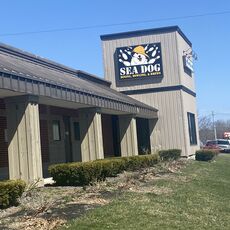
With dining habits changing, Maine restaurants rush to adapt
 Alexis Wells
Rapid Ray's, a fast food stand at 189 Main St. in Saco, has seen an increase in customers, likely because of the type of restaurant it is.
Alexis Wells
Rapid Ray's, a fast food stand at 189 Main St. in Saco, has seen an increase in customers, likely because of the type of restaurant it is.
More Information
As Maine heads into its busy tourist season, the state is still seeing staffing shortages affecting businesses, especially the restaurant industry.
It's no secret that the pandemic resulted in a crisis for the restaurant industry in 2020. As things eased somewhat in 2021, restaurants began to see challenges surface, including workforce shortages and supply chain issues. Those issues resulted in longer wait lines, fewer restaurants open in busy tourist enclaves and shortages of ingredients.
Many patrons still see longer wait times, fewer tables, or their favorite establishments have closed due to rising costs due to inflation and the need for more workers.
Changing habits
Has all this led to changes in where and how often Mainers dine out?
The answer is yes — and no, at least according to a Mainebiz poll that recently asked readers if their dining habits have changed. Of roughly 400 people polled, 55% said they now dine out less often. About a third, 35%, said the frequency has not changed. Another 6% said they patronize different establishments. Just 4% said they dine out more often.
"We like to visit different establishments," said one voter. "The issue I see is the Maine dining scene is no longer a secret and it is more challenging to get tables at our favorite restaurants due to tourists. We don't go near the Old Port from Memorial Day to Labor Day. The 'sprawl' is becoming a challenge as well."
"My favorite restaurants in Portland are getting too pricey for the value of the meal," said another respondent. "Portland is now the home of the $20 cocktail and the $49 steak. Thank goodness the weather is getting better and we can grill our steaks at home."
As busy as ever
Although people seem to be eating out less often, some restaurants have been just as busy. Luke Holden, the owner of Luke's Lobster in Portland, told Mainebiz that his business has seen fewer staffing issues than the last year and is busier sales-wise.

That's also the observation of Krista Cole, owner of Sur Lie, a tapas restaurant on Free Street in Portland, and Gather in Yarmouth.
"We've noticed it's been a bit busier this year," she said. "It seems like regardless of what's going on people like to get together and go out to eat. We are feeling very optimistic."
Cole said although Sur Lie has struggled with labor shortages, it has a talented group of people working for the Portland restaurant.
"We have had more issues attracting talent to our restaurant [Gather] in Yarmouth than in Portland," she added.
In downtown Saco, a longtime family-owned restaurant is also seeing its customary number of customers. Brian MacDonald of Rapid Ray's, a fast food takeout stand on Main Street, said staffers have been able to keep up with customers since Rapid Ray's is not a sit-down restaurant that takes reservations.
"We have been more busy," said MacDonald. "It is one of two things: We are not short-staffed; we don't have a huge staff to begin with; there are about four people on at a time. The public recognizes we are available and we can handle the number of people coming in."
"We have trimmed back our margins to keep up with everything," MacDonald said about overhead. "Like every restaurant, we have seen an increase in our prices."
Rapid Ray's is far from alone. Many eateries have had to develop different ways to keep up with customers, including shorter hours and revised menus.
Closing the doors
But while many have been able to work through these issues, some well-known restaurants have closed or are planning to.

The owners of Portland's TIQA Mediterranean restaurant inside the Courtyard by Marriott hotel announced this week that they have plans to pull the shutters.
"Over the past three years, since COVID started, we have faced an exhausting ever-changing set of dynamics that we have yet to figure out how best to handle — because of this — we have decided to close TIQA and consider all possible future options," Deen and Carol Haleem said in a Tuesday Facebook post.

Sea Dog Brewing Co. announced on April 12 that it plans to close one of its two South Portland locations.
The Maine-based restaurant chain said it will close the site at 725 Broadway in South Portland.
Fred Forsley, co-founder and partner of Sea Dog Brewing, told Mainebiz, "It was a very difficult decision. The increased costs in the restaurant business made it hard for us to make money. We appreciate the support from other businesses and the community."
Challenges included supply chain disruptions, maintaining staff and other issues, he said.
In February, Rivalries owners Amy and Lance Meader announced on their website that the Portland location has closed permanently.
"With mixed emotions we share the news that we have sold our Rivalries Portland location. With heartfelt appreciation, we owe our staff and many guests over the years a huge thank you for making Rivalries Portland what it was. We consider so many people a part of the Rivalries family."
The new space will now be home to Thistle & Grouse.
Over on Thompson's Point, Rwanda Bean Co. also said it would shut down its retail presence at Thompson's Point on May 1, but plans to maintain its roastery, production and wholesale operations at the location. Rwanda Bean aims to expand its subscription and wholesale services by making changes. It also intends to keep operating its coffee shop at 463 Stevens Ave. in Portland, gradually increasing the hours of operation to seven days a week with an expanded menu.

"In order to further drive growth and stability for Rwanda Bean and to continue to deliver on our mission to support the community of Rwanda coffee farmers by sharing their harvests with the wider world, we are going to focus exclusively on our roastery operations, production and wholesaling out of our Thompson's Point location," the company posted on Facebook.
Creativity counts
When asked if Thompson's Point has seen a shift in the last few years due to the pandemic, Chris Thompson of Thompson's Point Development Co., replied, "Yes, absolutely. Everyone in the event, hospitality, food and beverage, and arts industries saw the world close in around them in 2020, and what followed was a slow and incredibly challenging re-opening with very little predictability. Those who survived and are fortunate to see themselves very busy again had to be tenacious, creative, and hopefully a little lucky … and had to take very good care of their employees, customers, and each other."














0 Comments